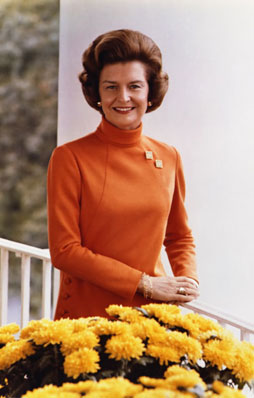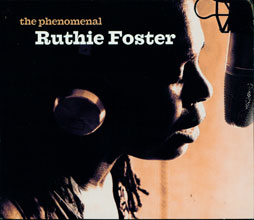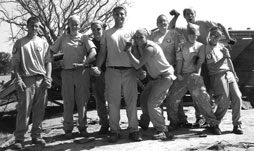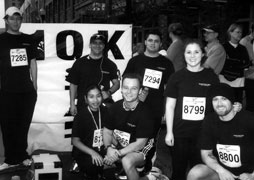By Keisha McDuffie/ne news editor
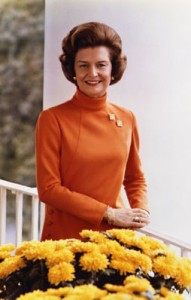
Many recognize the name Betty Ford, of the Betty Ford Center, a substance abuse rehabilitation facility known for its elite Hollywood clientele.
Yet Ford is not only a name on a sign, she is a real life woman living under a microscope for the world to see. The wife of Gerald Ford, the 38th U.S. president, the former first lady is also a mother of four, a breast cancer survivor, a recovering addict, an author and a recognized humanitarian.
Born in Chicago in 1918, Elizabeth Ann Bloomer and her family relocated a few times before settling in Grand Rapids, Mich. Ford began teaching other children dances such as the foxtrot, waltz and the big apple at age 11.
An accident claimed Ford’s father when she was just 16. Bloomer died from carbon monoxide poisoning while working on the family car.
Ford graduated from Central High School in 1933 and studied dance at the Bennignton School of Dance in Vermont. She studied under Martha Graham and Hanya Holm for two summers before moving to New York.
Taking up residence in Manhattan’s Chelsea neighborhood, Ford worked as a fashion model for the John Robert Powell Agency to finance her dance studies. She promised her mother, if nothing came from her dancing in New York after six months, she would return home to Michigan, which she did in 1941.
In 1942 Ford married a furniture salesman, whom she had known since she was 12. They had no children and divorced in 1947.
Gerald R. Ford Jr. met his wife at Grace Episcopal Church. He was campaigning for what would be the first of 13 terms as a member as of the U.S. House of Representatives. The New York Times reported, “Jerry was running for Congress and wasn’t sure how voters might feel about his marrying a divorced ex-dancer,” so the wedding was delayed until shortly before the elections in 1948.
After Nixon’s resignation, President Ford’s mission was clear: fix a broken nation torn apart by Vietnam and Watergate. His wife’s transition was not as smooth.
In a December interview with Newsweek, Sheila Rabb Weidenfeld, the first lady’s press secretary, recalled her first interview with the new first lady. She asked her what a first lady’s press secretary is supposed to do. “How should I know? I don’t even know what I am supposed to do,” Ford said.
Within the first month of the president’s inauguration, the first lady underwent a mastectomy because of breast cancer.
According to Newsweek, it was Ford’s insistence that the press statement was accurate and honest about her situation. Weidenfeld said the wording of the release was literally a decision made “on the operating table.”
“ Cancer was not a word that could be mentioned out loud,” Weidenfeld said.
“ Women came out of the shadows and stood in line for a mammogram. No longer because of Mrs. Ford’s courage and candor was breast cancer a disease of secrets,” John Schwarzlose, president and CEO of the Betty Ford Center, who has known Ford for more than 20 years, told Newsweek.
Honesty became the first lady’s trademark; however, not everyone always appreciated it, including her husband.
The Newsweek interview also said when Ford first met Weidenfeld, she told her, “You can’t teach an old dog new tricks.”
“ In other words, Betty was going to be the same person she always was,” Weidenfeld said.
For the first 25 years of marriage, while her husband was raising money for the Republican Party, she was raising their four children—alone. By the early 1970s, her children were almost grown, and the first lady was ready for a change.
After the 1976 election and her husband’s loss as president, Ford’s devastation would be masked by her substance abuse problems. Alcohol and pain medication, originally prescribed years earlier for arthritis and a chronic neck injury, were the first lady’s downfalls.
Weidenfeld told Newsweek she frequently cancelled events for Ford. On-lookers attributed it to fatigue and or stress, but those close to her blamed the substance abuse.
“ I liked alcohol; it made me feel warm,” she wrote in her 1987 memoir. “And I loved pills. They took away my tension and my pain.”
In January 1977 the former president and first lady moved to Thunderbird Country Club in Rancho Mirage, Calif.
Her daughter, Susan, and three other close friends attempted the first of two interventions in March 1978. Ford complained of a privacy invasion.
In April 1978, the entire family confronted Ford with an intervention that worked. Ford participated in a monthlong program at the Navy Alcohol and Drug Rehabilitation Service in Long Beach and remains clean to date.
In October 1982, she co-founded the Betty Ford Center with Leonard Firestone “to assist women and men and their families in starting the process of recovery from alcoholism and other drug dependency.”
To date, the center has helped more than 75,000 people on their roads to recovery.
























